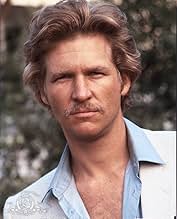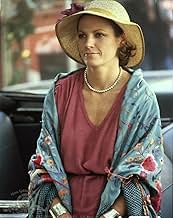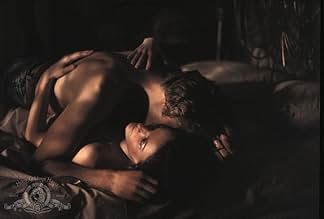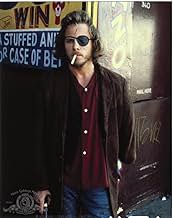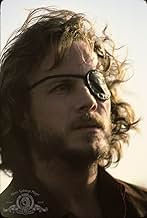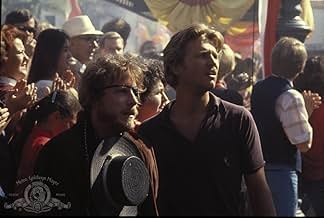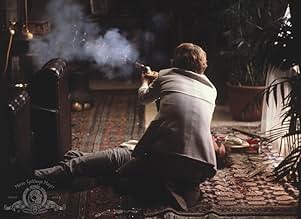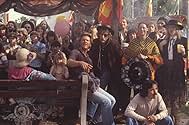PUNTUACIÓN EN IMDb
6,8/10
8,3 mil
TU PUNTUACIÓN
Richard ve a un hombre disponer de un cadáver y decide denunciarlo creyendo que es el culpable con su amigo Alex Cutter.Richard ve a un hombre disponer de un cadáver y decide denunciarlo creyendo que es el culpable con su amigo Alex Cutter.Richard ve a un hombre disponer de un cadáver y decide denunciarlo creyendo que es el culpable con su amigo Alex Cutter.
- Dirección
- Guión
- Reparto principal
- Premios
- 2 premios y 2 nominaciones en total
Francis X. McCarthy
- Toyota Man
- (as Frank McCarthy)
Reseñas destacadas
This movie is beautifully shot with a great score that sounds unlike any other score I've ever heard. Then you have a great performance from John Heard and a great screenplay that obviously had a tremendous novel behind it.
If you like those gritty late 70s early 80s California noir movies like Straight Time, Who'll Stop The Rain and Chinatown, this is as good as any of those. I have just watched it and I don't think I will forget it anytime soon. It's packed with memorable moments and fully-developed characters.
They don't make movies like this anymore. It makes me wonder what Jeff Bridges thinks about on the set of Iron Man 2 - I've never been a huge fan but the guy did a string of great dramas in the 80s like Fabulous Baker Boys, American Heart and this. He must be thinking "what happened to all those good scripts that used to be knocking around??"
If you like those gritty late 70s early 80s California noir movies like Straight Time, Who'll Stop The Rain and Chinatown, this is as good as any of those. I have just watched it and I don't think I will forget it anytime soon. It's packed with memorable moments and fully-developed characters.
They don't make movies like this anymore. It makes me wonder what Jeff Bridges thinks about on the set of Iron Man 2 - I've never been a huge fan but the guy did a string of great dramas in the 80s like Fabulous Baker Boys, American Heart and this. He must be thinking "what happened to all those good scripts that used to be knocking around??"
Cutter's Way cannot be overpraised. This movie is a masterpiece of the first order. Ivan Passer, a compatriot of Milos Forman, came to the USA as an experienced Czech movie director. Not unlike Alfred Hitchcock or some German directors 30 years before him, he seems to have made a thorough analysis of the American social conditions and general manners. He then transformed his findings into movies. Two of them I know deal with New York. They are appropriately gritty. The setting of Cutter's way is a Californian beach community for the rich and beautiful and the movie is appropriately glossy. The whole story takes place in those paradisiac locales. They are presented like an enchanted kingdom, a country of its own.
Under the glossy surface, there is a darker side to the place. There is prostitution, drug abuse and murder. Cutter, living on the fringes of the enchanted kingdom, sees that more clearly than everyone else. He has his own code of chivalry by which he wants to live. He develops conspirational theories and strains to convert them into hard facts. The world around him, populated by indifferent, amoral rich and beautiful people, does not understand him, does not even want to listen, laughs at him. So Cutter mounts a white stallion and rides a charge.
Repeatedly the film slips into surrealistic situations, in which the impression made on the viewers is more relevant than the storyline. This technique was well known in the forties (e.g. in film noir), present day audience are less used to it. In the earlier days of film making, surrealism was created on a soundstage, and the change between reality and "dream" became immediately clear. Passer uses real locations for situations removed from reality a daring experiment that rewards the viewers with hauntingly beautiful pictures but might also confuse many. The director took this risk and we are rewarded with a magnificent picture about a distinguished slice of America. I predict: Cutters way will one day become an honored classic.
Under the glossy surface, there is a darker side to the place. There is prostitution, drug abuse and murder. Cutter, living on the fringes of the enchanted kingdom, sees that more clearly than everyone else. He has his own code of chivalry by which he wants to live. He develops conspirational theories and strains to convert them into hard facts. The world around him, populated by indifferent, amoral rich and beautiful people, does not understand him, does not even want to listen, laughs at him. So Cutter mounts a white stallion and rides a charge.
Repeatedly the film slips into surrealistic situations, in which the impression made on the viewers is more relevant than the storyline. This technique was well known in the forties (e.g. in film noir), present day audience are less used to it. In the earlier days of film making, surrealism was created on a soundstage, and the change between reality and "dream" became immediately clear. Passer uses real locations for situations removed from reality a daring experiment that rewards the viewers with hauntingly beautiful pictures but might also confuse many. The director took this risk and we are rewarded with a magnificent picture about a distinguished slice of America. I predict: Cutters way will one day become an honored classic.
A friend of mine gave me the novel Cutter and Bone (AKA Cutter's Way) was based on, so that immediately creates a problem, comparing two different art forms.
Forget the novel (by the obscure Newton Thornburg) for this purpose only. The movie is a moving meditation on power, desperation, and paranoia. It is also a great love story.
I always end up writing "...you've read the other comments so you know what this is about" but Cutter and Bone is so many things, it cannot be pinned down easily.
As noted in the favorable reviews here, this is chock full of great film acting that moves the story along as well as making come alive. Who was the clueless shmoe who said "nothing happens"? What movie was he watching?
Adrift in post-Vietnam America, Cutter finally finds something in life that has meaning; the murder of a young hitchhiker.
But any meaning is too much for the damaged Cutter who becomes relentless in the pursuit of a possible killer who also is of the wealthy, powerful elite that sent OPS (other people's sons) to Vietnam. Cutter finally has a genuine target ("he's not anyone Rich, he's RESPONSIBLE" says Cutter to Richard Bone in a great line delivery by John Heard) for his unfocused righteous anger.
Bone tries to sabotage the investigation but ends up buying in at the very end. Why? He has the rage also, as did many Americans who weren't politically active, did not serve in Vietnam. It's a rage that infected a nation with guilt, self-doubt, and eventually, a new hubris, a kind of "never again" attitude toward "less developed" nations that has us yet again on the brink of yet another war in a series of wars that seem to never end and we hardly even notice anymore (remember Grenada? Bombing Tripoli and Benghazi? proxy armies in Nicaragua and El Salvador, etc.?)
The other part of Cutter and Bone is a love triangle and a very well explicated one at that. Cutter and Bone both love Mo who can't love herself. Bone is not as shallow as he appears and it scares him. Cutter is too damaged and angry to love her enough until she is gone.
I've known these people in one way or another, and that is why this movie has always meant so much to me. It is also about a great country I used to live in that began to disappear about the time this movie is set, and has since metamorphosed into a large wounded, angry monster, bereft of the tears for near-paradise lost that this excellent movie depicts.
Forget the novel (by the obscure Newton Thornburg) for this purpose only. The movie is a moving meditation on power, desperation, and paranoia. It is also a great love story.
I always end up writing "...you've read the other comments so you know what this is about" but Cutter and Bone is so many things, it cannot be pinned down easily.
As noted in the favorable reviews here, this is chock full of great film acting that moves the story along as well as making come alive. Who was the clueless shmoe who said "nothing happens"? What movie was he watching?
Adrift in post-Vietnam America, Cutter finally finds something in life that has meaning; the murder of a young hitchhiker.
But any meaning is too much for the damaged Cutter who becomes relentless in the pursuit of a possible killer who also is of the wealthy, powerful elite that sent OPS (other people's sons) to Vietnam. Cutter finally has a genuine target ("he's not anyone Rich, he's RESPONSIBLE" says Cutter to Richard Bone in a great line delivery by John Heard) for his unfocused righteous anger.
Bone tries to sabotage the investigation but ends up buying in at the very end. Why? He has the rage also, as did many Americans who weren't politically active, did not serve in Vietnam. It's a rage that infected a nation with guilt, self-doubt, and eventually, a new hubris, a kind of "never again" attitude toward "less developed" nations that has us yet again on the brink of yet another war in a series of wars that seem to never end and we hardly even notice anymore (remember Grenada? Bombing Tripoli and Benghazi? proxy armies in Nicaragua and El Salvador, etc.?)
The other part of Cutter and Bone is a love triangle and a very well explicated one at that. Cutter and Bone both love Mo who can't love herself. Bone is not as shallow as he appears and it scares him. Cutter is too damaged and angry to love her enough until she is gone.
I've known these people in one way or another, and that is why this movie has always meant so much to me. It is also about a great country I used to live in that began to disappear about the time this movie is set, and has since metamorphosed into a large wounded, angry monster, bereft of the tears for near-paradise lost that this excellent movie depicts.
Cutter's Way is one of my most favorite films. The characterization is excellent, the plot is both persuasive and surprising, and the acting is flawless--Lisa Eichhorn, whom I'd never heard of before, in particular. It's a travesty that virtually no one has heard of this film; all I can say is that it is well worth watching, if you can find it at your video store or watch it on late-night TV....
The title "Cutter's Way" is a reference to the main character, Alexander Cutter, perhaps cinema's all-time best antihero. John Heard plays the difficult role of an angry Vietnam veteran who returned from what he now regards as a meaningless war minus an arm, an eye, and a leg. He hates the fat cats-feeling that they conned him and others into patriotically serving while they stayed home, and he resents his best friend Richard Bone (Jeff Bridges) who avoided the war and continues to avoid any involvement or commitment. Commitment is Alexander Cutter's one remaining virtue, when he sets his sights on taking down an arrogant oil tycoon who has gotten away with murdering a 17 year old cheerleader, he stubbornly refuses to give up this mission and insists on doing it his way.
Heard should have gotten the Best Actor Oscar in 1981 (it went to Henry Fonda for "On Golden Pond") but "Cutter's Way" was not popular with critics and viewers so Heard was not even nominated. It is an amazing performance as Heard must win audience sympathy for a character who is not only unpleasant, but terribly abusive to everyone- especially his wife and his only two remaining friends. But he earns our admiration with his final act as a knight (on a white horse) who gallops into danger to avenge his wife's murder.
With this Cutter is finally revealed as a romantic who is willing to back up his angry words and seemingly empty threats. His anger is over more than his wasted wartime sacrifice. He feels frustration and confusion because while he has remained the same, the world has changed around him in ways antithetical to his beliefs (can you identify with that?). He recognizes that he has become irrelevant to this world but is not going out until he has made a last stand. His commitment ultimately gets Bone to take his first moral stand and finish what his friend started, doing it "Cutter's Way".
Like "Fat City" (another of Jeff Bridges' early films) "Cutter's Way" is more appreciated now than at the time of its release. In part this is because both of these films have held up very well, if anything their political messages are even more relevant today. Thematically "Cutter's Way" is a political film-both anti-war and anti-power; very much in the tradition of "Chinatown" and the world of Raymond Chandler adaptations.
This film is essentially a character study with an expressionistic ending. Most action/adventure fans will find it way too slow and cerebral for their tastes. The acting and the themes are its strength, the contrived story is a non-fatal flaw. The multi-dimensionality of Cutter, Bone, and Cutter's wife Mo (an extraordinary performance by Lisa Eichhorn) are carefully crafted and revealed by director Ivan Passer. Cutter's other remaining friend George (Arthur Rosenberg) is equally well crafted but more secondary to the story.
A fifth character (the dead cheerleader's older sister played by Ann Dusenberry) appears to be a victim of the post-production process as she simply disappears without explanation about 20 minutes before the film's end. Normally the absence of a supporting character would go unnoticed but Dusenberry had done such a nice job developing this character (maximizing what little she was given to work with) that the absence is glaring. Contemporary audiences will see a lot of Dominique Swain in Dusenberry. They not only look enough alike to be sisters but they have the same confident flare to their acting style. Passer had to work hard to keep Dusenberry reined in but succeeded in getting a nice restrained performance from her, her high intensity peeks through just enough to convey that there is more to her character than meets the eye.
Then again, what do I know? I'm only a child.
Heard should have gotten the Best Actor Oscar in 1981 (it went to Henry Fonda for "On Golden Pond") but "Cutter's Way" was not popular with critics and viewers so Heard was not even nominated. It is an amazing performance as Heard must win audience sympathy for a character who is not only unpleasant, but terribly abusive to everyone- especially his wife and his only two remaining friends. But he earns our admiration with his final act as a knight (on a white horse) who gallops into danger to avenge his wife's murder.
With this Cutter is finally revealed as a romantic who is willing to back up his angry words and seemingly empty threats. His anger is over more than his wasted wartime sacrifice. He feels frustration and confusion because while he has remained the same, the world has changed around him in ways antithetical to his beliefs (can you identify with that?). He recognizes that he has become irrelevant to this world but is not going out until he has made a last stand. His commitment ultimately gets Bone to take his first moral stand and finish what his friend started, doing it "Cutter's Way".
Like "Fat City" (another of Jeff Bridges' early films) "Cutter's Way" is more appreciated now than at the time of its release. In part this is because both of these films have held up very well, if anything their political messages are even more relevant today. Thematically "Cutter's Way" is a political film-both anti-war and anti-power; very much in the tradition of "Chinatown" and the world of Raymond Chandler adaptations.
This film is essentially a character study with an expressionistic ending. Most action/adventure fans will find it way too slow and cerebral for their tastes. The acting and the themes are its strength, the contrived story is a non-fatal flaw. The multi-dimensionality of Cutter, Bone, and Cutter's wife Mo (an extraordinary performance by Lisa Eichhorn) are carefully crafted and revealed by director Ivan Passer. Cutter's other remaining friend George (Arthur Rosenberg) is equally well crafted but more secondary to the story.
A fifth character (the dead cheerleader's older sister played by Ann Dusenberry) appears to be a victim of the post-production process as she simply disappears without explanation about 20 minutes before the film's end. Normally the absence of a supporting character would go unnoticed but Dusenberry had done such a nice job developing this character (maximizing what little she was given to work with) that the absence is glaring. Contemporary audiences will see a lot of Dominique Swain in Dusenberry. They not only look enough alike to be sisters but they have the same confident flare to their acting style. Passer had to work hard to keep Dusenberry reined in but succeeded in getting a nice restrained performance from her, her high intensity peeks through just enough to convey that there is more to her character than meets the eye.
Then again, what do I know? I'm only a child.
¿Sabías que...?
- CuriosidadesBefore production started on this film, Ivan Passer and producer Paul R. Gurian went to Jeff Bridges' house to ask him if he would agree to play Bone. After both entered Bridges' property, the actor's dog, a big German shepherd, attacked Gurian, biting him on the jaw. Gurian nearly died. Bridges later confessed that, after this incident, he had no choice but to accept the role in order to avoid being sued for several million dollars.
- PifiasValerie's disappearance is neither explained nor noted by the main characters.
- Citas
Alex Cutter: I don't drink. You know, the routine grind drives me to drink. Tragedy, I take straight.
Selecciones populares
Inicia sesión para calificar y añadir a tu lista para recibir recomendaciones personalizadas
- How long is Cutter's Way?Con tecnología de Alexa
Detalles
- Fecha de lanzamiento
- País de origen
- Idiomas
- Títulos en diferentes países
- A la manera d'en Cutter
- Localizaciones del rodaje
- 800 Alvarado Place, Santa Bárbara, California, Estados Unidos(El Encanto Hotel scenes.)
- Empresa productora
- Ver más compañías en los créditos en IMDbPro
Taquilla
- Presupuesto
- 3.000.000 US$ (estimación)
- Recaudación en Estados Unidos y Canadá
- 1.729.274 US$
- Recaudación en todo el mundo
- 1.752.634 US$
Contribuir a esta página
Sugerir un cambio o añadir el contenido que falta


